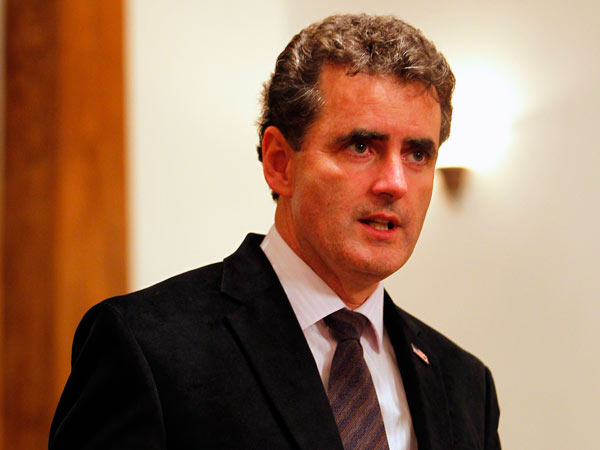1/17/2015
U.S. Rep. Maxine Waters (D., Calif.) called Fitzpatrick's bill a "gift to a handful of the biggest Wall Street banks" that "masquerades as technical fixes."
The Fitzpatrick push comes after Republicans in recent weeks rolled back two other Dodd-Frank provisions by attaching them to critical bills - one needed to keep the government running, and the other reauthorizing a program that helps businesses obtain insurance against the risk of terrorism.
That left President Obama and Democrats feeling they had no choice but to reluctantly agree to changes, even as the left fumed.
Democrats now fear an ongoing effort to pry apart the financial law.
The fights have centered on arcane banking practices, a factor Democrats say has helped Republicans obscure their intentions.
Their main objection to Fitzpatrick's plan centered on a provision to delay, from 2017 to 2019, a piece of the Volcker rule (named for former Federal Reserve Chairman Paul Volcker) requiring banks to unload complex packages of debt known as collateralized loan obligations. The requirement had already been pushed back from 2015.
The Volcker rule is a critical piece of Dodd-Frank. It is aimed at limiting banks' exposure to risky investments.
Waters said some members of Congress have become too close to Wall Street. Securities and investment and commercial banking interests have been among Fitzpatrick's top campaign donors, according to the nonpartisan Center for Responsive Politics, though he has received less from those sectors than many House members.
Major banks have spent heavily to lobby for changes in the Dodd-Frank rules.
The GOP has long objected to the rules, and with control of both houses of Congress, Republicans now have the power to force the issue.
But, unlike their attempts to repeal the Affordable Care Act in full, Republicans have carefully picked at specific pieces of Dodd-Frank, linking the changes to more popular pieces of legislation.
They say the changes are minor, and accused Democrats of reflexively clinging to regulations.
U.S. Rep. Jeb Hensarling (R., Texas) said Dodd-Frank has gone from ideology to "a religion."
Fitzpatrick's bill - the Promoting Job Creation and Reducing Small Business Burdens Act - passed the House, 271-154, Wednesday, largely on party lines. Only 29 Democrats supported it and one Republican voted nay.
The plan has little chance of becoming law on its own: Senate Democrats are opposed and the White House issued a veto threat, saying the proposal would put "working and middle-class families at risk while benefiting Wall Street and other narrow special interests."
But Republicans could revive pieces of the plan by attaching them to a bill that has broader support.
Among the changes that drew the ire of Democrats was one that would shield some private equity companies from added scrutiny by giving them an exemption from registering with regulators.
Another would let some financial firms trade derivatives privately, instead of in more public clearinghouses.
Republicans argued that the changes were targeted at provisions that unfairly hit "Main Street."
"One-size-fits-all regulations hurt the economy by treating small- and medium-size companies as if they are large and multinational corporations," Fitzpatrick said in a floor debate Tuesday night.
Democrats scoffed at his contention, and Rep. Stephen Lynch (D., Mass.) even took aim at the bill's title.
It "uses the veneer of job creation," he said, "to provide special treatment for well-connected corporations."
source
U.S. Rep. Mike Fitzpatrick
WASHINGTON - Rep. Mike Fitzpatrick (R., Pa.) stepped to the center this week of a growing national fight over rolling back parts of the Dodd-Frank banking reforms, passed to curb risky practices in the wake of the 2008 financial crisis.
A Fitzpatrick-sponsored bill to soften several Dodd-Frank regulations cleared the House on Wednesday, part of an effort, he and fellow Republicans say, to ease rules that have hindered investments in the economy.
"These are smart, technical reforms to an overly burdensome law," Fitzpatrick, a member of the Financial Services Committee, said on the House floor.
Most pieces of the Bucks County Republican's proposal had previously won bipartisan support.
Democrats, though, see the bill as part of an ongoing effort to subtly but substantially chip away at protections meant to shield Americans and the economy from risky banking practices.A Fitzpatrick-sponsored bill to soften several Dodd-Frank regulations cleared the House on Wednesday, part of an effort, he and fellow Republicans say, to ease rules that have hindered investments in the economy.
"These are smart, technical reforms to an overly burdensome law," Fitzpatrick, a member of the Financial Services Committee, said on the House floor.
Most pieces of the Bucks County Republican's proposal had previously won bipartisan support.
U.S. Rep. Maxine Waters (D., Calif.) called Fitzpatrick's bill a "gift to a handful of the biggest Wall Street banks" that "masquerades as technical fixes."
The Fitzpatrick push comes after Republicans in recent weeks rolled back two other Dodd-Frank provisions by attaching them to critical bills - one needed to keep the government running, and the other reauthorizing a program that helps businesses obtain insurance against the risk of terrorism.
That left President Obama and Democrats feeling they had no choice but to reluctantly agree to changes, even as the left fumed.
Democrats now fear an ongoing effort to pry apart the financial law.
The fights have centered on arcane banking practices, a factor Democrats say has helped Republicans obscure their intentions.
Their main objection to Fitzpatrick's plan centered on a provision to delay, from 2017 to 2019, a piece of the Volcker rule (named for former Federal Reserve Chairman Paul Volcker) requiring banks to unload complex packages of debt known as collateralized loan obligations. The requirement had already been pushed back from 2015.
The Volcker rule is a critical piece of Dodd-Frank. It is aimed at limiting banks' exposure to risky investments.
Waters said some members of Congress have become too close to Wall Street. Securities and investment and commercial banking interests have been among Fitzpatrick's top campaign donors, according to the nonpartisan Center for Responsive Politics, though he has received less from those sectors than many House members.
Major banks have spent heavily to lobby for changes in the Dodd-Frank rules.
The GOP has long objected to the rules, and with control of both houses of Congress, Republicans now have the power to force the issue.
But, unlike their attempts to repeal the Affordable Care Act in full, Republicans have carefully picked at specific pieces of Dodd-Frank, linking the changes to more popular pieces of legislation.
They say the changes are minor, and accused Democrats of reflexively clinging to regulations.
U.S. Rep. Jeb Hensarling (R., Texas) said Dodd-Frank has gone from ideology to "a religion."
Fitzpatrick's bill - the Promoting Job Creation and Reducing Small Business Burdens Act - passed the House, 271-154, Wednesday, largely on party lines. Only 29 Democrats supported it and one Republican voted nay.
The plan has little chance of becoming law on its own: Senate Democrats are opposed and the White House issued a veto threat, saying the proposal would put "working and middle-class families at risk while benefiting Wall Street and other narrow special interests."
But Republicans could revive pieces of the plan by attaching them to a bill that has broader support.
Among the changes that drew the ire of Democrats was one that would shield some private equity companies from added scrutiny by giving them an exemption from registering with regulators.
Another would let some financial firms trade derivatives privately, instead of in more public clearinghouses.
Republicans argued that the changes were targeted at provisions that unfairly hit "Main Street."
"One-size-fits-all regulations hurt the economy by treating small- and medium-size companies as if they are large and multinational corporations," Fitzpatrick said in a floor debate Tuesday night.
Democrats scoffed at his contention, and Rep. Stephen Lynch (D., Mass.) even took aim at the bill's title.
It "uses the veneer of job creation," he said, "to provide special treatment for well-connected corporations."
source





 DENVER – The excessive use of academic exams in Colorado’s public schools puts Hispanic students at a disadvantage, because they’re not sufficiently in context for the growing Latino student body, Denver educators told Efe.
DENVER – The excessive use of academic exams in Colorado’s public schools puts Hispanic students at a disadvantage, because they’re not sufficiently in context for the growing Latino student body, Denver educators told Efe. WASHINGTON – Tech giant Google has decided to suspend production and sales of its Google Glass virtual reality device from Jan. 19 onwards, but will continue to work on improving the product for a future return to the market, a company spokesman said on Thursday.
WASHINGTON – Tech giant Google has decided to suspend production and sales of its Google Glass virtual reality device from Jan. 19 onwards, but will continue to work on improving the product for a future return to the market, a company spokesman said on Thursday. CARACAS – Venezuela’s auto sector produced 19,759 vehicles last year, a sharp decline of 72.46 percent relative to 2013, the Cavenez industry association said on its Web site.
CARACAS – Venezuela’s auto sector produced 19,759 vehicles last year, a sharp decline of 72.46 percent relative to 2013, the Cavenez industry association said on its Web site.
